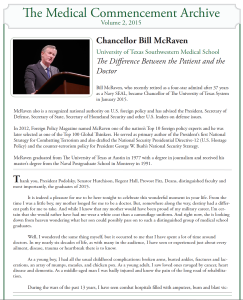This week, Chancellor Bill McRaven’s 2015 commencement speech at UT Southwestern Medical School entitled, “The Power of Giving Hope,” debuts the Medical Commencement Archive.
 Bill McRaven, who recently retired as a four-star admiral after 37 years as a Navy SEAL, became Chancellor of The University of Texas System in January 2015.
Bill McRaven, who recently retired as a four-star admiral after 37 years as a Navy SEAL, became Chancellor of The University of Texas System in January 2015.
McRaven also is a recognized national authority on U.S. foreign policy and has advised the President, Secretary of Defense, Secretary of State, Secretary of Homeland Security and other U.S. leaders on defense issues.
In 2012, Foreign Policy Magazine named McRaven one of the nation’s Top 10 foreign policy experts and he was later selected as one of the Top 100 Global Thinkers. He served as primary author of the President’s first National Strategy for Combatting Terrorism and also drafted the National Security Presidential Directive-12 (U.S. Hostage Policy) and the counter-terrorism policy for President George W. Bush’s National Security Strategy.
McRaven graduated from The University of Texas at Austin in 1977 with a degree in journalism and received his master’s degree from the Naval Postgraduate School in Monterey in 1991.
Chancellor McRaven begins his speech by boldly listing the very real responsibilities and expectations that graduates now have as residents and doctors in practice:
“As a patient, I want my doctor to be smarter than I am. I want them filled with knowledge and I want them to understand how to use that knowledge to confront the challenge before them… As a patient, my doctor must at all times be in command – in command of themselves, in command of people around them and in command of me.”
He continues by narrating his personal experience as a patient with Chronic Lymphocytic Leukemia and the life-altering and healing power of hope that one physician gave him:
“All because one man gave me hope. Because one man healed me of my greatest malady: fear.
Above all else, as doctors, you must give your patients hope. Even under the most dire of conditions, hope can heal. Hope surpasses all our understanding.
Hope is the medicine that gives smiles to the forlorn, faith to the disenchanted and life to the dying.
Give your patients hope.”
He finishes by reminding graduates that although delivering bad news can be spiritually crushing and debilitating enough to push physicians into an emotional separation from patients, maintaining compassion and faith is a moment that patients will remember forever:
“A thousand moments to restore their faith, a thousand moments to give them hope, a thousand moments to heal their wounds and to show them the love and compassion that every great doctor must possess.
And that first moment begins right here and right now, because for now and evermore, you will be the doctor.”

